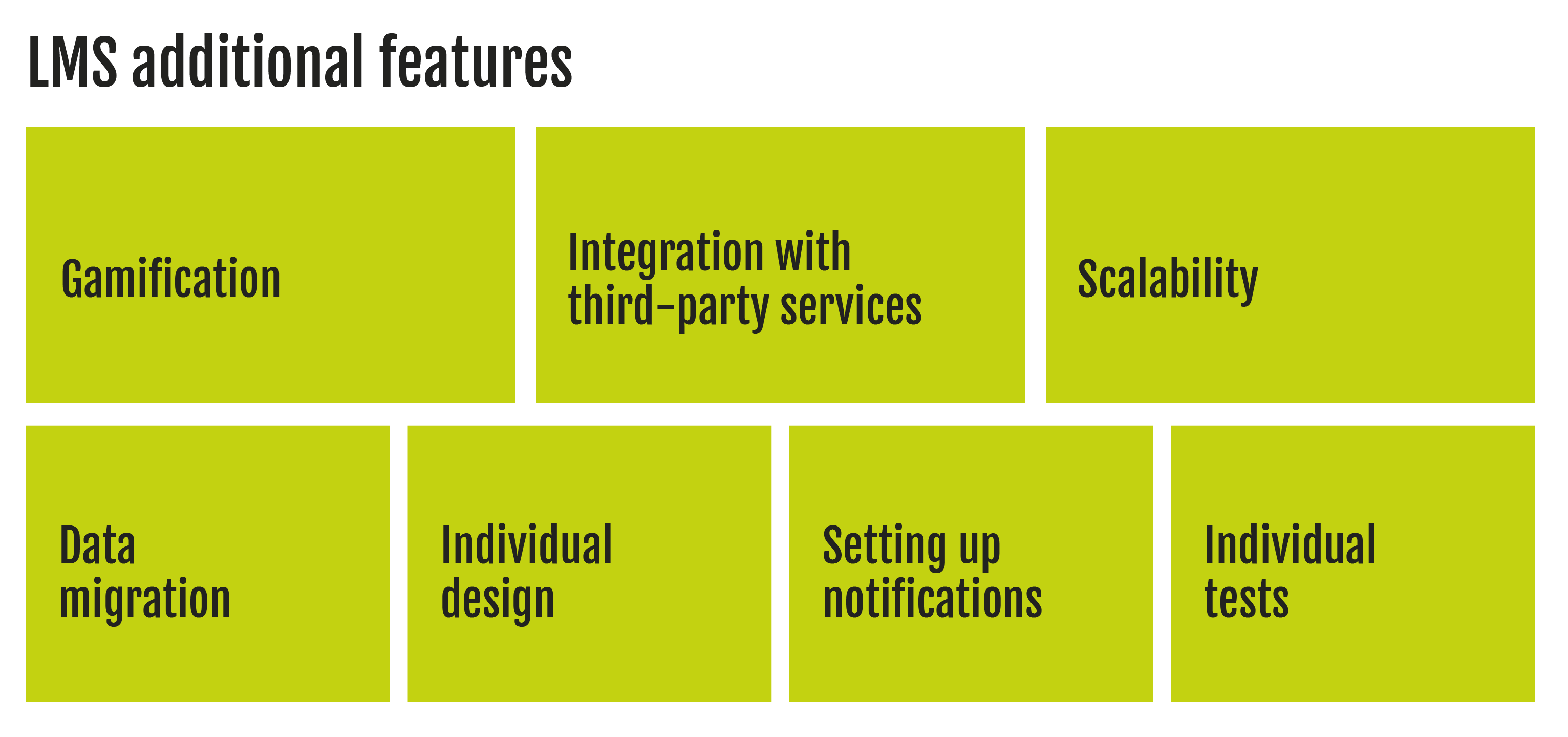Businesses of all sizes now see the benefits of introducing e-learning to their corporate training. Due to the pandemic, there was a significant surge in educational technologies such as Learning Management Systems (LMS). Now e-learning plays a central role in corporate training. It helps businesses to cut their instruction and learning expenses by about 60%.
Employers want their employees to advance themselves and develop their skills systematically. To provide the enabling factors for continuous learning, the employer should arrange the conditions necessary for this.
Since numerous organizations accept the necessity and demand for continuous learning these days, learning management systems are becoming common at workplaces. Let’s look at what a corporate LMS is and how your business can benefit from it.
What is a Corporate LMS?

LMS meaning business is a software that helps to manage onboarding processes, career training and skill development. Implementation of a corporate LMS enables employees and C-level management team to meet specific e-learning needs. Moreover, LMS is a repository of learning materials, lectures, presentations, books, and courses. It can be accessed from any device.
Top corporate LMS solutions deliver online courses and other learning materials (video lessons, lectures, presentations, books) to your employees. It helps to onboard new employees, then give them the knowledge and skill development tools required to perform their roles and, ultimately, advance faster in their careers.
Why is LMS Software Important in Corporations?
So what does LMS stand for in business? LMS (Learning Management System) software is indispensable in corporations due to its multifaceted benefits. Firstly, it serves as a centralized hub for all training initiatives, facilitating easy access to resources and courses for employees across various departments and locations. This centralized approach not only saves time but also fosters consistency in training delivery and content, ensuring that all employees receive uniform learning experiences.
Additionally, LMS software streamlines training management processes, from scheduling sessions to tracking progress, thereby enhancing organizational efficiency. Its scalability accommodates the evolving needs of the company, whether it's onboarding new hires or delivering specialized learning programs. Moreover, LMS software plays a crucial role in ensuring compliance with regulatory requirements by providing documentation and tracking capabilities essential for audits.
4 Main Types of Corporate Learning Management System
Cloud-Based
These systems are hosted on remote servers accessed via the internet. They offer flexibility, scalability, and ease of access from anywhere with an internet connection. Cloud-based LMS solutions typically require subscription-based pricing.
Locally Hosted
Locally hosted LMS software is installed and run on the company's own servers and infrastructure. This type of LMS in business offers greater control over data and security but requires more technical expertise for maintenance and management.
Commercial
Commercial LMS solutions are developed and sold by software vendors for a fee. They often come with a range of features and support services tailored to corporate training needs. Commercial LMS providers may offer customization options and ongoing support.
Open-Source
Open-source LMS software is freely available and can be modified and redistributed by users. It provides flexibility and customization options but may require more technical expertise to set up and maintain. Organizations using open-source LMS can benefit from community support and contributions.
Who Uses Corporate LMS Platforms?
Corporate LMS platforms are utilized by various stakeholders within organizations, including:
- Employees:
Employees are the primary users of corporate LMS platforms. They utilize these systems to access training materials, courses, and resources relevant to their roles and career development. Enterprise learning platform enables employees to complete mandatory compliance training, enhance their skills, and stay updated with industry trends.
- Human Resources (HR) Departments:
HR departments leverage LMS platforms to manage training programs, track employee progress, and ensure compliance with regulatory requirements. They use LMS data to assess training effectiveness, identify skill gaps, and develop strategies for talent development and succession planning.
- Training and Development Teams:
Training and development teams are responsible for designing, developing, and delivering training content within organizations. They utilize LMS platforms to create and organize course materials, administer assessments, and monitor learner engagement. LMS platforms enable training teams to efficiently deliver both in-person and online training programs.
- Managers and Supervisors:
Managers and supervisors utilize LMS platforms to assign training courses to their teams, track their progress, and provide feedback and support as needed. LMS platforms empower managers to monitor employee development, identify high-performing individuals, and address performance gaps through targeted training interventions.
- Executives and Leadership:
Executives and leadership teams utilize LMS platforms to gain insights into organizational learning and development initiatives. They rely on LMS data and analytics to assess the impact of training programs on business performance, make strategic decisions regarding resource allocation, and align training efforts with overall business objectives.
- Compliance and Regulatory Teams:
Compliance and regulatory teams utilize LMS platforms to ensure that employees receive mandatory training on topics such as safety procedures, data security, and industry regulations. LMS platforms enable compliance teams to track training completion rates, generate compliance reports, and demonstrate regulatory compliance during audits.
How Can Сorporate LMS Systems Help Your Business?

The transition from traditional, offline training to e-learning may seem challenging, but the results are worth it. For every dollar spent on e-learning, businesses make back $30 in productivity. Moreover, having the appropriate tech in place will make this transition smoother.
Use cases for a corporate learning management system:
1.Company Products Training
AI-powered learning management system is an appropriate tool to educate your employees on your services or products. Steady acquisition and processing of information lead to a deeper understanding of processes, products and services, increase employees efficiency, and, consequently, bring more business benefits.
JohnsonJohnson has more than 350 products represented. With the help of the best corporate learning management system the company tests and trains its managers to know all the product range from A to Z.
2. Smooth Onboarding
LMS helps to optimize the onboarding process. New employees study the company history, values, mission, corporate culture, partners and clients. It makes the initial adaptation faster.
Oticon Inc states that they use an LMS system to transfer knowledge and information to new managers around the world, no matter where they are now.
3.Knowledge Sharing With Partners
LMS implementation boosts affiliated programs and provides more value to counterparties through affiliated learning management.
Hyundai mobis provides 400 dealerships with useful training workshops, e.g. corporate culture, mission vision, business goals using corporate learning management system. Having switched to e-learning they reduced their training costs to a fifth.
4. Specific Skill Training
Using LMS, you can assign employees to specific courses to learn the necessary job skills. You also can train several teams or departments at once.
Villa St.Vincent specializes in the medical field. It is vital for them to train employees in different areas, such as laboratory and clinical skills. Since they started to use LMS to achieve their goals, they have managed to increase employee retention from 69.6% to 86.4%.
5.Sales and Customer Support Skills Training
LMS plays a considerable role in the system for sales training and ensures the volume of products sold, providing salespeople precisely with the knowledge and information they need.
Forapharm provides knowledge training about products and services for their sales representatives with dialogue simulations, which is really helpful to improve soft skills.
Benefits of LMS systems for business
Cost-Effective Employee Training
LMS systems for business streamline training processes, reducing costs associated with traditional training methods like in-person seminars or workshops. They enable companies to deliver training materials online, eliminating expenses related to travel, venue rental, and printed materials.
Real-time Monitoring and Reporting
LMS platforms provide real-time tracking of employee progress and performance. Managers can monitor who has completed training modules, track assessment scores, and identify areas where additional support may be needed. This real-time monitoring facilitates proactive intervention and ensures that training goals are being met.
Data Security
LMS systems prioritize data security, safeguarding sensitive employee information and training materials. They typically offer features such as secure user authentication, encryption protocols, and role-based access controls to protect data from unauthorized access or breaches.
Improved Organizational Oversight
LMS platforms offer centralized management of training initiatives, providing administrators with comprehensive oversight of learning activities across the organization. This centralized approach enhances coordination, consistency, and standardization of training content and delivery methods.
Smooth Communication Integration
LMS systems often integrate seamlessly with other communication tools and platforms used within the organization, such as email, messaging apps, and collaboration software. This integration enhances communication between learners, trainers, and administrators, facilitating collaboration and knowledge sharing.
Five Reasons Why You Need a Corporate LMS
- Enhanced Accessibility:
A corporate LMS provides anytime, anywhere access to training materials, enabling employees to learn at their own pace and convenience, regardless of location or time zone.
- Scalability:
As businesses grow, their training needs evolve. A corporate LMS scales to accommodate the changing needs of the organization, whether it's onboarding new hires, expanding into new markets, or implementing new compliance regulations.
- Compliance Assurance:
A corporate LMS ensures that employees receive the necessary training to comply with industry regulations, safety standards, and corporate policies. It tracks training completion and generates workplace learning report to demonstrate regulatory compliance during audits.
- Performance Improvement:
A corporate LMS enables organizations to identify skill gaps, track employee progress, and provide targeted training interventions to improve performance and productivity across the workforce.
- Cost Savings:
By streamlining training processes, reducing administrative overhead, and eliminating the need for physical training materials, a corporate LMS delivers significant cost savings over traditional training methods, making it a cost-effective investment for businesses of all sizes.
Five Reasons Why You Need a Corporate LMS Platform
1. Training Cost Reduction
You will not need to pay for traveling, printed materials, and on-site facilitators. In this case, training costs will be dramatically reduced. On average, the transfer of corporate training software to an LMS-platform reduces its cost to a fifth.
Like any other aspect of business, customer training requires money. The Gallup State of the American Workplace report found that inadequate training costs businesses $13.5 million per year per 1,000 employees. A company can quickly reduce its useless investment by implementing an corporate training LMS. With time-saving tools, more effective training methods, and improved accessibility, the right platform will be a necessity for a successful business.
2. Easy Tracking Of Learner Progress
A course management system allows you to keep track of the progress of your learners. It also allows you to know if their digital learning goals are met.
3. HR Processes Automation
HRMs can digitize databases and documents, create programs for the personnel department and automate up to 70% of their routine work. Thus, HR managers don't waste time on processes that can be auto-motivated and stay more focused on their tasks.
4. Increased Performance Management
By empowering your staff through training, you manage the company productivity growth by making the most efficient use of human resources.
5. Reduced Employee Turnover
By maintaining compliance with training requirements, you raise your ratings as an employer in the marketplace and enhance brand reputation
Moreover, you can measure the ROI (Return on Investment) by dividing the sum of these gains and savings by the learning management systems cost. Thus, you will be able to track, analyze and understand the size of investments and return on implementing LMS into the business process. Here is how you can calculate it: [Gains + Savings] / Cost of the LMS = ROI
The Main Features of a Corporate LMS
Online Commerce
Corporate LMS platforms often include online commerce capabilities, allowing organizations to sell courses or training materials to external customers or clients. This feature enables businesses to monetize their training content and expand their revenue streams.
Individualized Experiences
Corporate LMS platforms offer personalized learning experiences tailored to the needs and preferences of individual users. They utilize features such as adaptive learning paths, personalized recommendations, and competency-based assessments to deliver customized learning content and optimize learning outcomes.
Learning on Mobile Devices
Corporate LMS platforms support learning on mobile learning devices, enabling employees to access training materials and complete courses anytime, anywhere, using smartphones or tablets. This mobile-friendly approach enhances accessibility and flexibility, allowing learners to engage with learning content on the go.
Collaborative Learning in Social Spaces
Corporate LMS platforms foster social and collaborative learning through social features such as discussion forums, chat rooms, and social media integration. These social spaces facilitate knowledge sharing, peer-to-peer collaboration, and community building among learners, enhancing engagement and motivation.
Harnessing Artificial Intelligence (AI)
Harnessing Artificial Intelligence (AI) offers immense potential for businesses across various industries. AI technologies, including machine learning, natural language processing, and computer vision, empower organizations to automate processes, gain insights from data, and enhance decision-making. In the corporate context, AI can be leveraged in several ways:
- Personalized Learning:
AI tailors learning experiences to individual needs, boosting engagement and effectiveness.
- Predictive Analytics:
AI predicts future training needs and identifies at-risk employees, aiding decision-making.
- Adaptive Learning Paths:
AI adjusts learning paths based on progress and preferences, optimizing outcomes.
- Automated Content Creation:
AI automates content creation, saving time and ensuring consistency.
- Natural Language Processing (NLP):
NLP powers features like chatbots, aiding communication and feedback.
- Smart Content Recommendation:
AI recommends relevant training materials, enhancing engagement and exploration.
What is the Best LMS for Corporate Training and How PioGroup Can Help
We have a profound expertise in educational solutions development. Here is one of our recent success stories. We were recently approached by a law firm that wanted to implement and optimize HR and education processes in the company. The client wanted to put onboarding processes on track, reduce the time spent on HR activities, and increase the expertise of its employees. To develop the product that will match all business needs, the business owner chose to create a custom LMS for corporate training.
The main objectives that stood behind the LMS implementation were the following:
Optimize the Onboarding Process
It was necessary to cut hours of HR managers spent on onboarding. At the same time, to give employees quick and interactive access to corporate values and company culture, regulations and policies.
Build an Effective Employee Training Process
The company needed to improve employees skills: hard skills (civil and international law) and soft skills (the art of negotiation and stress resilience). All the necessary materials, such as links to events, videos, books, tests and training, were uploaded to the LMS for corporate.
Also, we implemented Machine Learning (ML). The system itself offered relevant topics to employees who passed the basic development plan new tests, articles, videos or links.
Thus, the corporate LMS software helps employees to optimize the learning process on an ongoing basis. The employees achieve their goals, grow professionally, and are satisfied with their development. At the same time, it helps the company to improve its performance metrics and employee expertise. It positively affects the client retention rate and increases the overall performance of the company.
Conclusion
After integrating LMS, many companies reported that people began to adapt more quickly, intensively develop a passion for the company spirit, and share corporate values. Furthermore, they reduced costs for organizing employee training and improved employee performance.
Having a deep understanding of the corporate training process, we are ready to support your business with a tailored corporate LMS software to meet your business needs. Our custom LMSs comprise an easy-to-use interface, a quick constructor of courses, knowledge assessment, user management, have an adaptive UI, data import and export, interface branding, reports. To suit your specific business needs better we are eager to integrate LMS with special services such as video, chats, payment gateways, plugins, CRM, and API.
We provide different organizations, like small and medium-sized businesses and enterprises, with appropriate learning management systems. In our approach, we use both options: custom solution and open-source LMS. This approach helps to adjust LMS development to the company business needs, size and budget and to develop additional features if needed. Contact us and we will turn your idea into a product.





